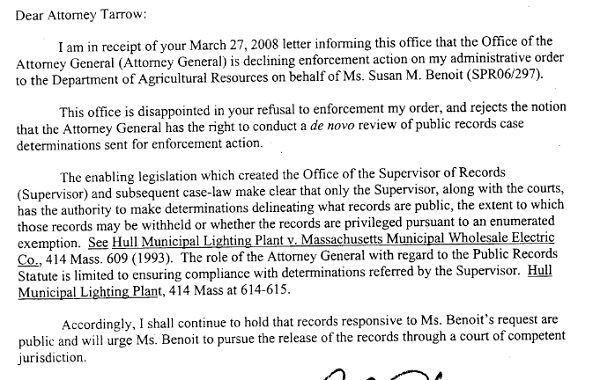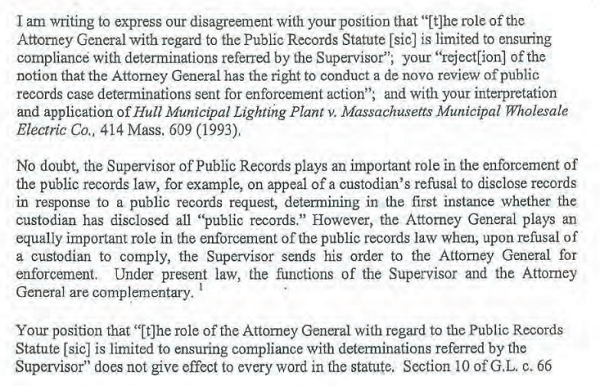A Tale of Two Transparencies
 Recently, we wrote about the redemption of Secretary of State William Galvin after a records request for communications between his office and the Office of the Attorney General revealed the frustrating brush-offs he had received from the previous two AGs. Shortly thereafter, we received a response to an identical request we had made to the AG’s office. Since both requests were asking for the same documents, the correspondence should have been identical; what was received sheds light on how each office handled the request.
Recently, we wrote about the redemption of Secretary of State William Galvin after a records request for communications between his office and the Office of the Attorney General revealed the frustrating brush-offs he had received from the previous two AGs. Shortly thereafter, we received a response to an identical request we had made to the AG’s office. Since both requests were asking for the same documents, the correspondence should have been identical; what was received sheds light on how each office handled the request.
The AG’s office provided mostly their own letters to Secretary Galvin’s office and neglected to provide the responses or original referral letters from Secretary Galvin’s office. In comparison, Secretary Galvin’s office provided almost all correspondence between the two offices, with some notable exceptions.
The best example of this inconsistency is in regards to the “strongly worded letter” from Galvin’s office we discussed in the previous piece, which chastised the AG’s office for overstepping their authority in cases of public records violations; second-guessing, then reversing Galvin’s determinations. The letter is the logical conclusion to years of pent-up frustration over being undermined again and again by an ostensible ally; not exactly triumphant defiance, but defiance nonetheless.
Conspicuously missing from Galvin’s release, however, was the five-page letter the AG’s office sent back in response, noting that “The Attorney General is not required to take any action to ensure compliance with the Supervisor’s order … particularly where that order does not serve the public interest as a whole.” The letter, filled with specific and detailed case examples, highlights the strained relationship between Galvin and the previous AGs, which hindered their ability to grant these public record appeals. The very fact that this retort is absent from Galvin’s responsive materials – and that Galvin’s original letter isn’t included in the AG’s release – is indicative of how the pervasive effects of this strained relationship impact transparency.
Going a step further, the materials turned over by the AG’s office highlighted just a half of the communication between the two offices; the AG’s response to a complaint was often the only correspondence provided. Besides most of the correspondence being absent, the entirety of the correspondence regarding an appeal was also not included in the AG’s records. Deliberate or not, these missing communications raise serious concern for the implementation of public records policy.
What we are left with, therefore, is “A Tale of Two Transparencies”, a remarkably untransparent process that yielded unsatisfying results from both sides. While Galvin is clearly more forthcoming with his records – including whole conversations that the AG simply did not provide – the existence of any inconsistency is itself representative of the obstacles that prevent true disclosure in Massachusetts. Withholding — or “losing” — documents that present your side in an unfavorable light does not contribute to the pursuit of democracy; nor does mismanaging the recordkeeping of an office that allows such infractions to occur. In light of the extensive public dissatisfaction with the Public Records Law demonstrated at last week’s legislative hearing, serious steps must to be taken to remedy this issue.
Part of the important discussion at the hearing was Rep. Peter Kocot’s H.2772 and Sen. Jason Lewis ‘s S.1676, which would give the Secretary of State’s office enforcement power that is now vested in the AG’s office. The Galvin-AG communications would indicate that this is a step in the right direction, as turf battles between constitutional officers deter transparency. While the current AG, Maura Healey, has vowed to work with Secretary Galvin on this issue, the matter should be corrected through clearly defined legislation so the public’s right of access is not contingent on the personalities and politics of those in office.
Lessons like “A Tale of Two Transparencies” need to be taken to heart by our legislatures – and now is the time.
J. Patrick Brown is the Editor of Muckrock.com, an organization which facilitates public record requests and serves as an independent news source covering government transparency issues nationwide.
Sabrina Chishti is a Transparency Intern at Pioneer Institute from Tufts University majoring in biology and political science.




